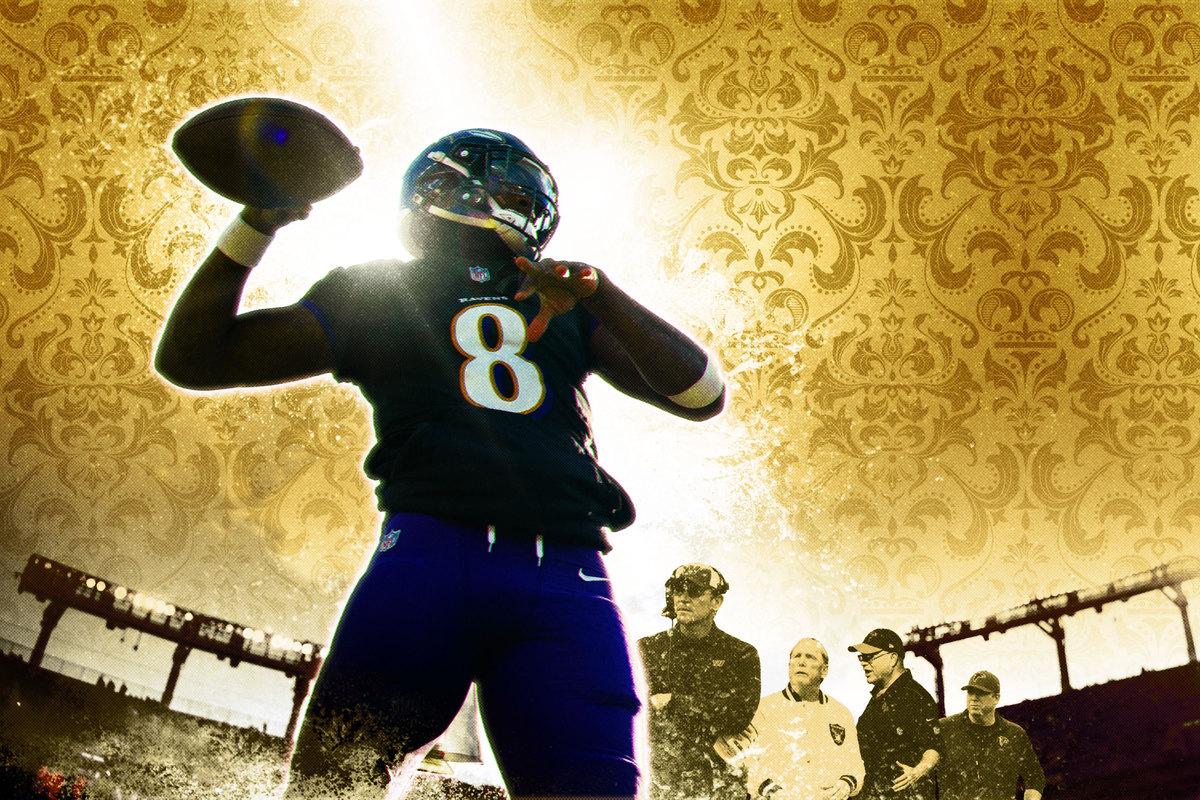
Hearty congratulations to Baltimore Ravens quarterback Lamar Jackson, who is, in all likelihood, just a few weeks away from being named the NFL’s Most Valuable Player for the second time in his career. If he does indeed win this award a few days before the Super Bowl in February, Jackson will become the youngest two-time winner since the merger; he was already the youngest player in this era to win MVP when he did it for the first time in 2019.
If those kudos seem premature, consider Jackson’s case: He’s the quarterback of a 13-win team that has the no. 1 seed in the AFC locked up before Week 18. His last outing was a five-touchdown performance against the Dolphins, another playoff team. The week before that, Jackson and the Ravens handily beat the 49ers, the no. 1 seed in the NFC, and the difference between Jackson’s play and that of Brock Purdy, another MVP contender, was, um, stark. He’s had a career-best season in completion percentage, interception rate, and yards per pass attempt, and he leads the league in rushing yards per attempt. He is the MVP, which has got to feel pretty good, particularly given that just 10 months ago Jackson was embroiled in a contract dispute with the Ravens that grew contentious enough that he asked to be traded, a request that Baltimore answered by giving him the non-exclusive franchise tag and the rest of the league answered with a total brush-off.
So in honor of Jackson’s impending coronation as MVP, let’s recall all the reasons NFL teams with questionable quarterback situations gave last spring when they could have made Jackson a contract offer and didn’t:
- In March, Falcons owner Arthur Blank said that Jackson was too injury prone: “Looking at it objectively I’d say there’s some concern over how long can he play his style of game,” Blank said. “He’s missed five, six games each of the last two years.”
- Commanders general manager Martin Mayhew was less specific: “There are a ton of talented players that could help us, but we don’t end up talking to [them] for various reasons. And Lamar falls into that category,” he said. Head coach Ron Rivera cited other roster needs and voiced his belief in quarterback Sam Howell.
- The Dolphins affirmed their commitment to QB Tua Tagovailoa.
- Colts owner Jim Irsay said (I think???) that he was worried about winning the Super Bowl. “There was an article recently saying the Rams mortgaged their future and now they’re paying for it after they won the Super Bowl and had all that success, with the draft picks not being there,” he said in March. “So, to me, that’s what you have to be careful about.”
- The Panthers and Raiders, according to ESPN’s Adam Schefter, both did briefly think about making a run at Jackson, but neither were “aggressive” in pursuit. (Carolina traded up to draft a 5-foot-10 quarterback at no. 1, and the Raiders signed Jimmy Garoppolo, the NFL’s version of a Spinal Tap drummer.)
- Patriots owner Robert Kraft said that Meek Mill texted him to say that Jackson was interested in playing for New England, but Kraft also said it was a decision he’d leave up to Bill Belichick. (In hindsight, this was as close to reasonable as anyone got.)
- Perhaps the best explanation came from Jets general manager Joe Douglas, whose team had not yet formally traded for Aaron Rodgers but was planning to: “We have our plan, we have our process, and we’re sticking to that,” he said in March. And boy, did they!
Obviously, this all goes down as a pretty epic whoopsie. But the denials of interest in a 26-year-old recent MVP from a normally QB-desperate league were issued so swiftly—the Falcons, Dolphins, Panthers, Raiders, and Commanders seemed to be in a race to leak to NFL reporters that they didn’t want Jackson—that it was easy to wonder whether something more sinister, namely, collusion on the part of owners eager to keep contract costs down and prevent other quarterbacks from getting a fully guaranteed deal like the one the Browns gave Deshaun Watson in 2022, was afoot. Then–NFLPA executive director DeMaurice Smith wrote in March that “owners have colluded in the past—and might do it again, as they are potentially doing right now—when it comes to highly-sought-after players.”
The evidence of collusion is circumstantial at best, but there probably doesn’t need to be a smoking gun for owners to agree that they’d like to hoard power and suppress player salaries. The best explanation for what happened with Jackson last spring probably involves a nasty and tangled combination of groupthink, risk aversion, bad scouting, and plain old racism that seems impossible to unravel. There is, however, one simpler factor, without which Jackson’s situation might have wound up different:
The franchise tag.
In early March, after struggling to find common ground on a long-term deal, Baltimore used the non-exclusive franchise tag on Jackson. This kept him from becoming an unrestricted free agent; he was allowed to talk to other teams and receive a contract offer, which the Ravens would have been able to match. If they didn’t want to match, they would have received two first-round picks in return for giving up Jackson’s rights. In theory, it should have been a win-win for any of these teams in need of a franchise quarterback: Either a team going after Jackson could get a franchise-altering player, or at the very least they’d force Baltimore to pay a little extra. And either way, Jackson would get the long-term contract he’d been seeking.
But in practice, the non-exclusive tag almost never leads to a player changing teams, nor does it lead to much benefit financially. The last time a player on a non-exclusive tag got a contract offer that was accepted and the other team received the full compensation of two first-rounders was in 2000, when wide receiver Joey Galloway went from the Seahawks to the Cowboys.
Even so, the non-exclusive tag is used more often than the exclusive tag. The exclusive tag has been used on only four players since 2012: Drew Brees (2012), Von Miller (2016), Kirk Cousins (2017), and Le’Veon Bell (2017). The reason for this is simple: The non-exclusive tag is cheaper.
Under the non-exclusive tag, Jackson would have made $32.5 million this season; under the exclusive tag he’d have made at least $40 million. Though he did not wind up playing on the tag, it’s still a baseline that influences negotiations. Jackson eventually signed a five-year, $260 million contract with the Ravens that briefly made him the highest-paid player in NFL history. (Justin Herbert and Joe Burrow each surpassed him when they signed their new contracts later in 2023.)
It’s a fine deal, but broadly, it was a win for the owners, whose aim was to avoid giving another full guarantee like Watson had received an offseason earlier. Jackson’s case serves as an example of how the tag’s main function is to exert downward pressure on a player’s leverage. After all those teams announced their disinterest, Jackson wound up re-signing with the team that had effectively told him it could live without him, the team he’d requested a trade from. That may be bygone now, but it doesn’t seem like the type of thing worth encouraging.
And it sure seems now like some of the teams that ignored Jackson when he was theoretically available should be regretting their inaction.
Atlanta, Carolina, Las Vegas, and Washington all have quarterbacks currently ranked 24th or worse in total efficiency. Garoppolo played in just six games for the Raiders—he missed time with a concussion and a back injury and was later benched. Both of the Falcons quarterbacks, Desmond Ridder and Taylor Heinicke, have dealt with injuries, and even when healthy, neither has been particularly effective. The Panthers spent two first-round picks and more to have their season go so badly that their owner is throwing drinks on opposing fans. The Commanders and the Patriots will both be picking in the top five come draft time.
Admittedly, things worked out pretty well for the Colts: They drafted a promising quarterback in Anthony Richardson, who played well before suffering a season-ending injury in October, and it seems unlikely that they will win the Super Bowl, which I’ve heard you have to be careful about.
The Dolphins’ lack of interest in Jackson was relatively defensible given how well Tagovailoa had played in his first season under head coach Mike McDaniel in 2022. They are a playoff team this season, but they would clearly be a better team with Jackson as their quarterback. You could also make the argument after watching how thoroughly Jackson’s Ravens dominated Miami in Week 17 that Miami might be in a better position today just by having made an offer. If the Ravens had been pushed a bit more financially with Jackson, they might not have had the cap flexibility to, say, sign wide receiver Odell Beckham Jr., who was part of the receiver corps that torched the Dolphins last Sunday.
The Jets, well, they have their process and they’re sticking to it.
In many ways, all’s well that ends well for Jackson. He seems happy, he’s played exceptionally well, and the franchise has finally put him in an offense that maximizes his talent and surrounded him with quality skill-position players. And it really must feel good to have this dominant season after getting the cold shoulder from one-third of the league.
Jackson has proved his value and made those teams, if not the rest of the league, look very foolish. They may be fine with this—the NFL knows the franchise tag is a rare tool of market suppression and it’ll go far to preserve it. But when Jackson accepts that MVP trophy in February (either in person or in a recorded video message, given that there’s a solid chance he’ll have a game coming up), it’ll serve as a personal accomplishment and a pretty massive own goal by a group of owners more interested in preserving their power than in making their teams better.


